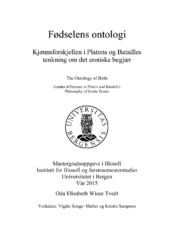Fødselens Ontologi: Kjønnsforskjellen i Platons og Batailles tenkning om det erotiske begjær
Master thesis
Permanent lenke
https://hdl.handle.net/1956/10016Utgivelsesdato
2015-05-15Metadata
Vis full innførselSamlinger
- Department of Philosophy [240]
Sammendrag
This thesis will examine the ontology of birth in the thoughts of Bataille and Plato. By making birth, pregnancy and the female body the prism through which the connection between death, sexuality and transgression is examined, I hope to shed new light upon their respective thinking on gender difference and human eroticism. Performing a reading of Story of the Eye, I will look into the position of the female body in Bataille's Eroticism and explore the foundation upon which gender difference in Bataille's philosophy can be said to rest. Furthermore, I will explore how this affects his thinking on death. Violence is a key concept in understanding Bataille's connection between physical eroticism and death, and the question I will raise with regard to this aspect of his thinking is if his sacred experience of transgression is equally obtainable for both men and women, or if the male body is a necessary condition for transgression. Plato's metaphors of birth in Theaetetus and in the Symposium will inform my reading of the relation between death, erotic longing and reproduction in his philosophy. I will look in to how he makes the connection between body and soul, and how the female body is positioned within his dualistic division of body/soul. The question is not whether Plato leaves the body behind; rather, I will ask whether the female can be implemented in the transcendental ascension, and if so; how does this relate to his thinking on being and birth? Finally, I will attempt a comparison between Bataille and Plato's philosophical concepts of the erotic, with a focus on how this affects their thinking on the connection between birth, death and the female.
Beskrivelse
Forfatter har rettet noen korrekturfeil i oppgaven etter levering.
